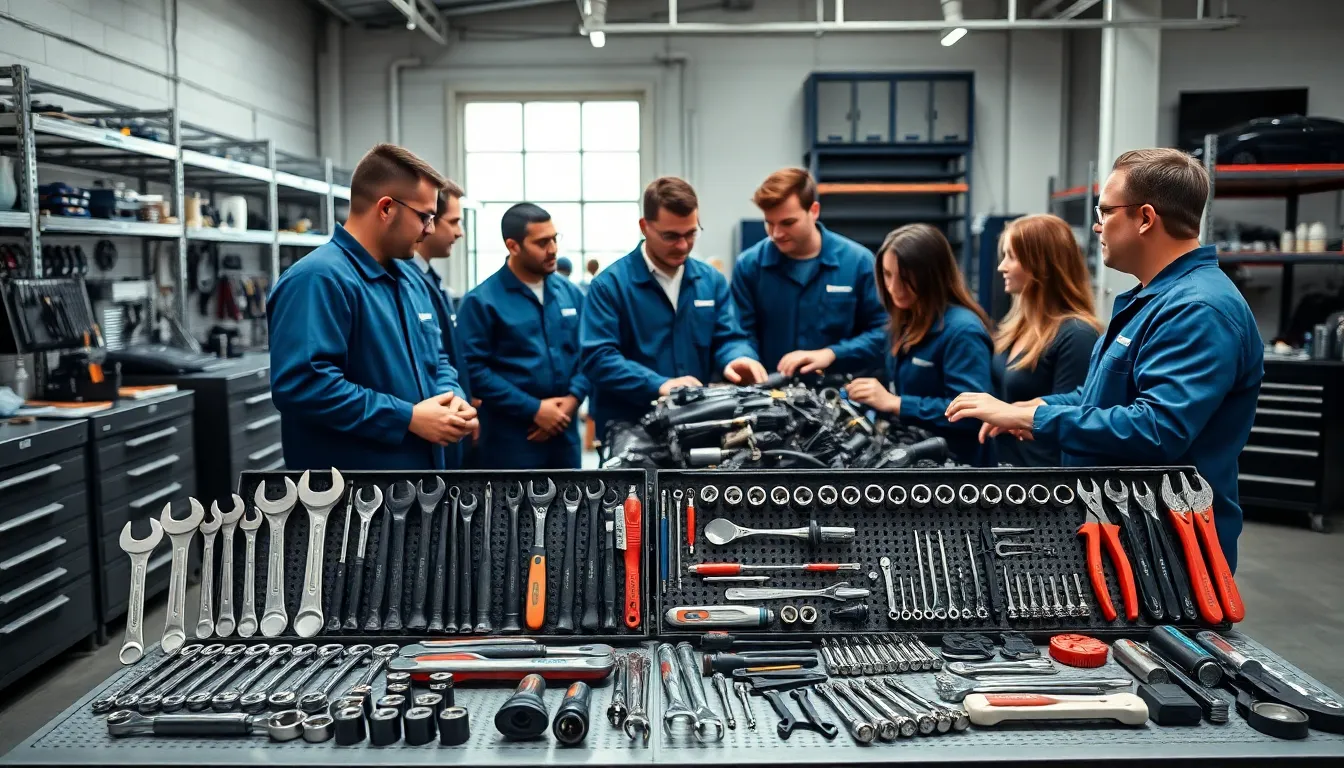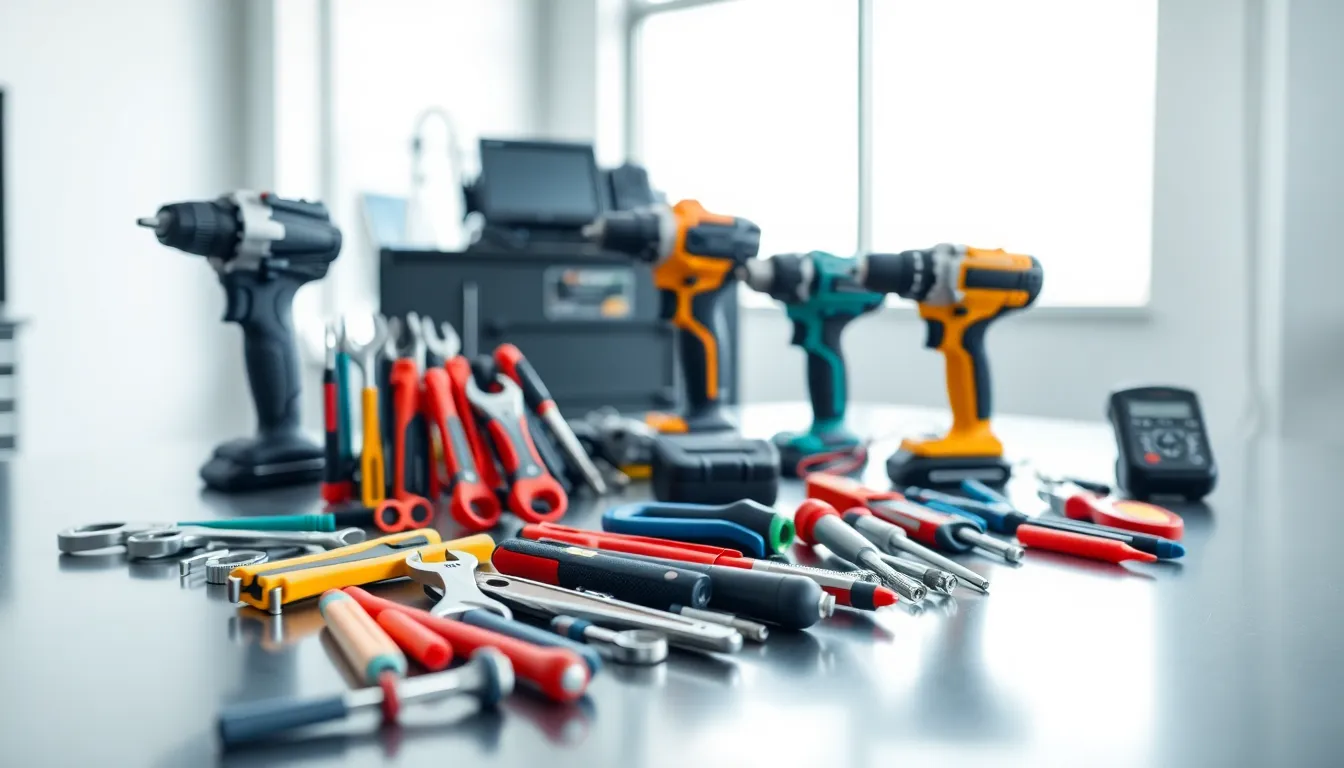When you think of automobile workshop tools, what comes to mind? Most people picture a chaotic garage filled with greasy tools, but it’s time to change that narrative. Automobiles have become a part of our daily life, and having the right tools can make a world of difference in both car maintenance and repair. Imagine effortlessly fixing squeaky brakes or smoothly replacing that pesky oil filter, sounds dreamy, right? Let’s jump into the essential gear every automotive workshop should boast, helping you wield your wrench like a pro and keep those engines purring.
Table of Contents
ToggleEssential Hand Tools for Auto Repair

In any automobile workshop, hand tools form the backbone of daily operations. From simple tasks like changing oil to more complex repairs, having the right hand tools at your fingertips can make all the difference. Here’s a round-up of the must-have hand tools:
Wrenches
Having a set of wrenches is like owning a miracle worker. They come in various sizes, and a ratcheting wrench can make life infinitely easier when you’re in tight spots. Don’t forget to have both metric and SAE sizes.
Screwdrivers
Next up are screwdrivers. A set with various head sizes and types (flat, Phillips, and possibly Torx) is essential. You never know when you might need to tackle a unique screw.
Pliers
Pliers are indispensable. They can grip and twist wires, hold small parts in place, and even assist in pulling things apart. A diverse variety, including needle-nose and slip-joint, is ideal.
Hammers
You might think a hammer is optional for automotive work, but never underestimate its power. A soft-faced hammer is great for tapping delicate parts without causing damage.
Socket Sets
Socket sets speed up your work significantly. Using a ratchet along with various sockets can get stubborn bolts out in no time, speeding up the whole repair process.
Equipped with these essential hand tools, tackling even the most stubborn vehicles becomes manageable.
Power Tools That Every Workshop Needs
When it comes to efficiency and speed, power tools are the superheroes of any workshop. Here are the power tools you should not skimp on:
Impact Wrench
An impact wrench is a must-have for loosening and tightening bolts quickly. It’s especially useful for tire changes and when you encounter rusted screws.
Drill
A cordless drill is invaluable for drilling holes or driving screws. Choose one with variable speeds to handle different jobs effectively.
Grinder
Grinders can smooth down rough edges and help cut through metal with ease. They also come in handy for eliminating rust and cleaning up your workspace.
Air Compressor
This one might surprise you. An air compressor fuels a variety of tools including nail guns and spray paint systems. It’s a multifunctional marvel and definitely worth the investment.
Bench Grinder
Sometimes, sharpening is necessary. A bench grinder is perfect for not only sharpening but also grinding down materials and creating a new edge on your tools.
Investing in these power tools will significantly speed up and simplify your workshop jobs.
Diagnostic Tools for Modern Vehicles
In an age where vehicles are becoming increasingly complex, having robust diagnostic tools is non-negotiable. Here’s what every workshop should have:
OBD-II Scanner
An OBD-II scanner is essential for reading error codes and diagnosing issues. This tool connects to the vehicle’s onboard computer system, quickly revealing what’s wrong.
Multimeter
A multimeter helps in checking electrical components. It measures voltage, current, and resistance, making troubleshooting electrical issues a breeze.
Code Readers
Although simpler than OBD-II scanners, code readers are handy for basic diagnostics. They often come with user-friendly interfaces that help DIY enthusiasts.
Tire Pressure Gauge
In a world where safety is paramount, a tire pressure gauge ensures that tires are adequately inflated. This simple tool can prevent costly accidents and improve fuel efficiency.
Battery Tester
To avoid unexpected breakdowns, a battery tester is indispensable. They help you gauge battery health and ensure that electrical systems are covered.
With these diagnostic tools, modern vehicles can be approached with precision and confidence, saving both time and resources.
Safety Equipment in the Workshop
Safety should be everyone’s top priority. Equipping your workshop with the right safety gear helps mitigate risks:
Safety Glasses
First and foremost, safety glasses protect against flying debris. They’re essential for any task that could send small, sharp objects your way.
Gloves
Leather or heavy-duty gloves are necessary for handling sharp tools and hot components. They can save your hands from cuts and burns.
Ear Protection
Power tools can be deafening. Using proper ear protection, like foam earplugs or noise-canceling headphones, ensures long-term hearing preservation.
Fire Extinguisher
This might seem basic, but it’s critical. Ensure you have a fire extinguisher located nearby, preferably one rated for electrical and flammable material fires.
First Aid Kit
Accidents happen, so it’s wise to keep a well-stocked first aid kit accessible. It should include bandages, antiseptics, and tools to handle minor injuries.
By prioritizing safety in the workshop, you foster a secure environment conducive to effective auto repair.
Maintenance and Storage of Tools
Taking care of your tools is just as important as having them. Here’s how to maintain and store them properly:
Tools for Specialized Repairs
If your workshop caters to specialized repairs, make sure to have dedicated storage for tools unique to those services. Keeping them organized prevents confusion and promotes efficiency.
Common Mistakes to Avoid When Using Tools
Many individuals neglect the maintenance of their tools. Avoid leaving tools exposed to moisture and dirt. Always clean them after use and store them properly. Also, be mindful of over-exerting tools: they are not indestructible.
Regular maintenance can drastically extend the lifespan of your tools, letting you get the most bang for your buck.
Choosing the Right Tools for Your Workshop
Choosing the right tools is crucial for anyone serious about automotive repair. Here are some considerations:
Assess Your Needs
Begin by identifying the most common repairs encountered. Base your tool selection on these insights to ensure you have what’s necessary.
Quality Over Quantity
While it might be tempting to bulk up on cheap tools, investing in high-quality brands usually pays off in the long run. Tools that are designed to withstand heavy use can save you money and frustration.
Tool Reviews
Before making a purchase, check out online reviews and testimonials. They can guide you towards reliable and efficient tools.
Budgeting
Finally, set a budget. While tools are an investment, it’s wise not to expensive. Prioritize essential tools first and expand your collection over time as needed.
Selecting the right tools involves a blend of careful consideration and smart investment.




